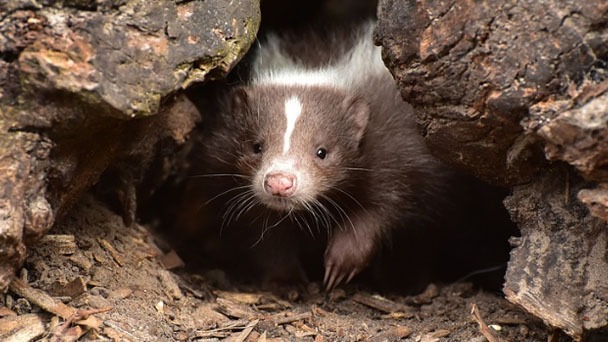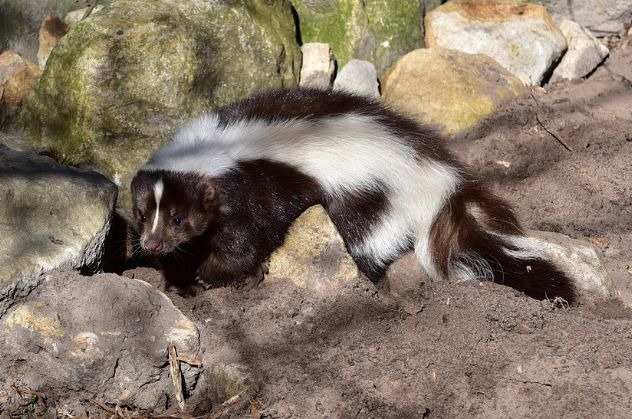How to Get Rid of Skunks from Your Garden Effectively
Written by Ivy
Jan 30 2023

Act immediately if you believe there is a skunk loitering in your yard. Here's how to recognize and keep skunks out of your garden and yard.
Quick Steps to get rid of Skunks:
- Remove Food Sources
- Install Lights
- Use Skunk Repellents
- Relocate Them
What Are Skunks?

Skunks are nocturnal animals that are naturally mild-mannered and non-aggressive; they prefer small animals and insects for dinner instead of your garden. On rare occasions, they go to gardens, and if they do, it might be because corn or other plants are close to the ground.
From coast to coast, the skunk asserts its right to homestead. Distributed across the country are 4 species of skunks, including the striped skunk (Mephitis mephitis) and the spotted skunk (Spilogale putorius). The common striped skunk spends most of its time in sparse fields and forests.
Because they dig up and consume the larvae of cutworms, Japanese beetles, hornworms, and other crop-destroying insect life, skunks can be very beneficial to have around. Skunks will, however, eat anything in their path, including small game, leaves, buds, grasses, grains, and garbage. They are also partial to insects. While searching for these grubs, they may also disturb your plants. They can become a little annoying to gardeners because of this.
Even though their nocturnal wanderings through our lawns, gardens, and flowerbeds occasionally inconvenience us and make us uneasy, these are minor flaws that can be easily overlooked by the time the Harvest Moon starts to shine. So that Moon can shine over a cornucopia brimming with plenty is made possible by the skunk's appetite for the pests that plague our gardens.
How to Identify Skunks in Your Garden
Unfortunately, the best way to recognize skunks is frequently by their smell. Hopefully you won't have to deal with skunk spray in your garden, but as soon as they decide to do so, you'll be able to identify them for sure.
The typical striped skunk has thick, white stripes down its back and black fur on the rest of its body. It is the most prevalent species of skunk in the US and is about the size of a house cat. Smaller and with broken white streaks throughout their black fur, spotskunks differ from regular skunks by having white spots. Skunks are ideal for digging because they have short legs and large, proportionate feet with strong claws.
Skunks can be recognized using their tracks. Skunks and raccoons both have five toes, which leads to frequent confusion between the two. In skunk tracks, the fifth toe can occasionally be challenging to see. Their claw marks are typically somewhat visible, and their heels are typically not a part of the tracks. Undigested insect parts are also frequently found in skunk droppings.
How to Get Rid of Skunks
1. Remove Food Sources
Skunks are timid, skittish animals, so if one makes its way into your yard, chances are good that it has a good reason for being there, i.e. food. Is the cover over your trash bin securely fastened? Are pet food, a bird feeder, or an open compost pile luring the skunks? Try enclosing your crops with a low fence to prevent skunks from using your garden's fruits and vegetables as bait. Skunks won't be able to climb over, but a determined animal can dig under a fence, so as a deterrent, think about burying some of the fence or sprinkling cayenne or chili powder around the fence's perimeter.
2. Install Lights
Being nocturnal creatures, skunks dislike bright light. They are frequently startled off by a floodlight with motion detection.
3. Use Skunk Repellents
Skunks dislike some odors, which may seem ironic (as if they have the right to judge). Skunks can be scared away by the smells of citrus, ammonia, mothballs, and predator urine (dog, coyote, etc.). Keep mothballs and cotton balls soaked in ammonia away from children if you use them.
4. Relocate Them
You can put dirt in the skunk's hole if you can find where it lives. Just watch out in the spring, when the skunk might be hiding young in her den! And if you're in a pinch, you might be able to capture the skunk alive and move it to another natural area. Too timid to confront a persistent skunk head-on? Attempt the phone book, online or in the yellow pages, and conduct a search for "pest control" or "wildlife control." It's simply best to leave delicate tasks to the professionals sometimes.
How to Keep Skunks Away
- Spray a solution of castor oil and water-diluted dishwashing detergent. The smell is repulsive to skunks. When the skunk is out hunting at night, spray the area.
- A light is most likely the most effective skunk deterrent. Skunks only come out at night, and their eyes are extremely sensitive to light. Skunks can be driven away by a strong light or a floodlight with a motion sensor.
- Skunks, like the majority of animals, detest the scent of citrus fruits. As a natural skunk deterrent, scatter orange or lemon peels throughout the yard.
- Skunks can be repelled using predator urine (dog, coyote). Commercial garden centers sell these. (Note: Make sure the animals are treated humanely and the brand complies with state and federal regulations by using a trustworthy source for predator urine.)
- Ammonia-soaked rags have been scattered around the yard with great success by many readers, but these must frequently be changed.
- Put bars of strong-smelling soap or a room deodorizer close to your garden if the skunks are in a smaller area of your garden. Skunks dislike overpowering smells, which is ironic.
- If nothing else works, there are humane ways for experts to capture skunks and raccoons and transport them to other locations. When a skunk is involved, trapping is frequently the only option, and there isn't much else you can do. However, keep in mind that many wildlife species do not survive when introduced to new environments, and that it might not even be permitted to capture and relocate wild animals in your region.
Why and How Do Skunks Spray?

Skunks are renowned for their skunk spray; you can smell an irate skunk more than a mile away. Furthermore, a skunk can "shoot" you from 10 to 12 feet, sideways, up, or down, with little apparent effort. The majority of gardeners are more concerned about a skunk spraying in the garden, on the gardener, or on a pet than they are about it eating some vegetables.
Two pouches with a pair of ducts are located under a skunk's tail. During times of peace, these ducts remain hidden, but when danger approaches, they quickly protrude. Their foul ammunition is a golden-yellow liquid with mercaptan sulfide as its main component. Six rounds' worth of ammo are contained in each of the two pouches. It takes a week to replenish the supply once it is depleted. Nearly all animals, including the majority of humans, fear skunks as a result of this spray.
Skunks only engage in defensive warfare. Skunks will attempt to avoid an encounter by ambling away when confronted by an aggressive person or noisy dog. This implies that you should be fine if you simply turn around after spotting a skunk. Skunks turn to face their pursuer if they are being pursued, stamp their forefeet, and then turn away. This is their first cautionary tale. You ought to be escaping at this point!
Their tails, all but the tips, are hoisted, which serves as the second warning. Once the skunk has formed a U and is facing the target with its snout and tail, a charge of spray is released. This ultimatum failed to bring about peace. It's simply too late now, and your dog probably stinks.
People typically get sprayed while walking through their yards after dark (you can't run away from a skunk if you can't see it) or if they disturb a skunk while it is eating. These are valid arguments for preventing skunks from entering your yard in the first place and for always having a flashlight on you.
Signs of Skunk Damage
You might have a skunk issue if your lawn or flower bed has numerous holes in it. Skunks trample the grass in search of grubs. They are active at night and create distinct, 3- to 4-inch deep holes in grassy areas. Skunk activity rises in the spring and naturally declines, so any issues may end on their own.
Corn is a food source for skunks on occasion, but they typically only consume the lower, easier-to-reach ears. Raccoons are more likely to blame if a corn stalk has fallen over. This harm can be reduced by planting corn varieties that are taller.
Skunk spray is undoubtedly a typical indication of damage. You most likely have skunks if your dog smells bad.
What to Do If You Get Sprayed by a Skunk
We can all detect the scent of a skunk from great distances, but it's awful to have it on your person. Although clothing can be washed, skin and fur may continue to smell afterward. If you or your pet gets sprayed by a skunk, try the following:
- Make a mixture of 1 quart 3% hydrogen peroxide (fresher is better), 1/4 cup of baking soda, and 1 to 2 teaspoons of liquid dish soap.
- Use the solution to shampoo only the area where the skunk sprayed. While avoiding the eyes, wet the area and use your hands to work the solution into the skin or fur. Wait until the fizzing stops, which should take around 5 minutes.
- Use water to thoroughly rinse.
- Repeat the procedure if the odor is still there.
- Use a towel or the air to dry; do not use a hair dryer as the heat may cause any lingering skunk scent to settle into the skin or fur.
After the skunk smell has subsided, use a high-quality crème rinse to rehydrate the skin because this remedy may cause it to become dry.
When to Call a Professional to Get Rid of Skunks
The time to call a professional may have come if you've tried all of the suggestions above and the skunk still won't leave your yard.
Avoid attempting to remove a skunk yourself if it is acting strangely. One of the main species thought to carry the rabies virus is the skunk. Consult your local animal control or the state wildlife agency for advice if you believe the skunk may be rabid. Aggressiveness, daytime activity, and seizures are all signs of rabies.
If you think the skunk has young, that is another reason to call an expert. Skunk kits typically remain in their burrow until they are more mature, making it challenging to completely eradicate your skunk problem if you don't call a professional.

How to Keep Skunks Out of Your Home
By taking a few easy precautions, you can keep skunks out of your home. Make sure your trash cans have tight-fitting lids or are locked shut to reduce food sources (like open garbage cans). Choose bird feeders that have seed catchers. Before evening, take away any pet food that has been left out in the open. Likewise, never put table scraps in your compost bin. A family of skunks might consider any of these items to be a tasty snack.
The Bottom Line on Skunks
If you're still concerned about how to keep skunks away, keeping your property free of things like grubs and other skunk-attractive food sources will help you to easily avoid an unpleasant skunk encounter. However, if a skunk does decide to settle down, you can evict this unwanted visitor by using a humane and safe skunk repellent. You should seek assistance from your local wildlife authority if you notice that the skunk is acting strangely because it might be infected with rabies.
Frequently Asked Questions
How Do You Get Skunks in a Yard?
Skunks are drawn to trash, bird or pet food, water sources, and hiding places under houses or sheds. Keep an eye out for potential locations where a skunk might choose to settle.
How Do You Spot Skunk Burrows?
Skunks can burrow anywhere, including under decks, porches, dead trees, drainpipes, and rock piles. Watch out for holes, tracks, or a musty smell in your garden and yard. These are telltale indicators that a skunk is nearby.
How Do You Humanely Relocate Skunks?
Ultrasonic noise transmitters or all-natural peppermint sprays are a couple of the numerous efficient, non-lethal, and compassionate skunk deterrents available today. Never buy skunk deterrents made from predator urine because they are produced in cruel ways.
How Do You Keep Skunks from Returning?
Skunk control primarily involves prevention. Any areas beneath your house, garage, or shed where a skunk could burrow should be sealed off. Always shut trash cans tightly. Skunks' need to forage for food will be reduced by lawn maintenance, including grub prevention
Latest Updated
- How to Get Rid of Skunks from Your Garden Effectively
- Will Lysol Kill Spiders - Does All Types of Lysol Work?
- How to Get Rid of Ground Moles with Dawn Soap
- Do Mothballs Keep Spiders Away - How to Use Moth Balls
- How Do You Get Rid Of Possums - Possum Control Guide
- How To Use Vinegar to Get Rid of Armadillos Quickly
- Does Peppermint Oil Repel Spiders - Get Rid Of Spiders
- Does Cornmeal Get Rid of Ants - How to Use It
- How Do Exterminators Get Rid Of Mice In Walls - Is It Work?
- How To Control & Get Rid of Nutsedge
Popular Articles
- Winter maintenance of Antirrhinum Majus
- How to Grow Terminalia Mantaly Tree
- How to Grow and Care for Crossostephium Chinense
- How to grow Antirrhinum Majus in spring
- Peristeria Elata (Dove Orchid) Profile: Info & Care Guide
- Underwatered Snake Plant (Sansevieria Trifasciata) - Signs And How To Fix
- How to Care for Brazilian Jasmine Plant (Mandevilla Sanderi)
- How to Grow & Care for Graptopetalum Purple Delight in Summer
- Rosa Chinensis (China Rose): Plant Growing & Care Tips
- How to Care for Baby Sun Rose (Aptenia Cordifolia)